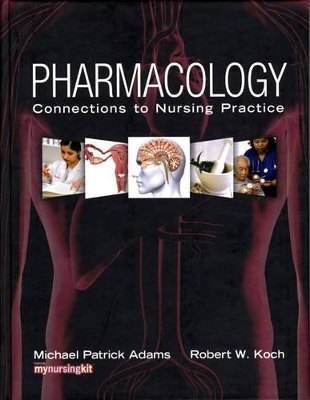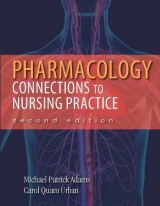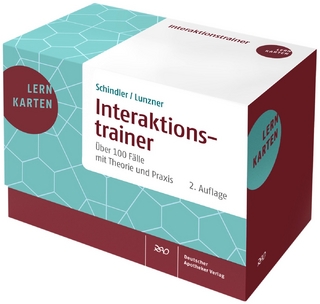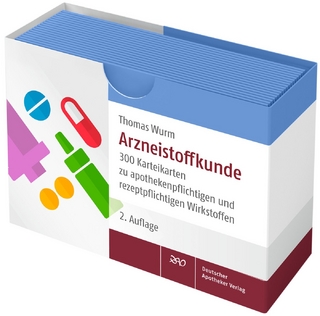
Pharmacology
Pearson
978-0-13-152599-3 (ISBN)
- Titel erscheint in neuer Auflage
- Artikel merken
Author website: www.authorcasting.com/pearson/adams/pharmacology/cb/
Author website: www.authorcasting.com/pearson/adams/pharmacology/cb/ About the Authors Michael Patrick Adams , PhD, RT(R), is an accomplished educator, author, and national speaker. The National Institute for Staff and Organizational Development in Austin, Texas, named Dr. Adams a Master Teacher. He has published two other textbooks with Pearson Publishing: Core Concepts in Pharmacology and Pharmacology: A Pathophysiologic Approach. Dr. Adams obtained his Master’s degree in Pharmacology from Michigan State University and his Doctorate in Education at the University of South Florida. Dr. Adams was on the faculty of Lansing Community College and St. Petersburg College, and was Dean of Health Programs at Pasco-Hernando Community College for 15 years. He is currently Professor of Biological Sciences at Pasco-Hernando Community College. Robert W. Koch, DNS, RN, serves as Associate Dean and director of graduate studies at Loewenberg School of Nursing, University of Memphis. He holds baccalaureate and master’s degrees in nursing from the University of Tennessee Medical Center and a doctorate in nursing administration from Louisiana State University Medical Center in New Orleans. He holds memberships in Sigma Theta Tau International, the National League of Nursing, and the American Organization of Nurse Executives Dr. Koch’s areas of academic expertise include nursing administration and leadership and nursing education. He has extensive administrative experience in acute care and in academic settings. Dr. Koch is a published author, an accomplished presenter, and a skilled researcher in nursing administration, gerontology, and educational technology.
Unit I — Fundamental Principles of Pharmacology
Chapter 1 — Introduction to Pharmacology: Concepts and Connections
Chapter 2 - Drug Regulations
Chapter 3 — Principles of Drug Administration
Chapter 4 - Pharmacokinetics
Chapter 5 — Pharmacodynamics
Chapter 6 — Adverse Drug Effects and Drug Interactions
Chapter 7 — Medication Errors and Risk Reduction
Chapter 8 — Pharmacology of Substance Abuse
Unit II — Pharmacology and the Nurse-Patient Relationship
Chapter 9 — Pharmacology and the Nursing Process
Chapter 10 — Pharmacotherapy During Pregnancy and Lactation
Chapter 11 — Pharmacotherapy of the Pediatric Patient
Chapter 12 — Pharmacotherapy of the Geriatric Patient
Chapter 13 — Psychosocial, Gender, and Cultural Influences on Pharmacotherapy
Chapter 14 — Pharmacotherapy in the Community
Chapter 15 —The Role of Complementary and Alternative Therapies in Pharmacotherapy
Unit III —Pharmacology of the Autonomic Nervous System
Chapter 16 —Review of Neurotransmitters and the Autonomic Nervous System
Chapter 17 - Cholinergic Agonists
Chapter 18 — Cholinergic Antagonists
Chapter 19 — Adrenergic Agonists
Chapter 20 — Adrenergic Antagonists
Unit IV — Pharmacology of the Central Nervous System
Chapter 21 — Review of the Central Nervous System
Chapter 22 — Pharmacotherapy of Anxiety and Insomnia
Chapter 23 - Pharmacotherapy of Mood Disorders
Chapter 24 - Pharmacotherapy of Psychoses
Chapter 25 -Pharmacotherapy of Degenerative Diseases of the Central Nervous System
Chapter 26 — Pharmacotherapy of Seizures
Chapter 27 — Pharmacotherapy of Muscle Spasms and Spasticity
Chapter 28 — Central Nervous System Stimulants and Drugs for Attention-Deficit Hyperactivity Disorder
Chapter 29 — Pharmacotherapy of Severe Pain and Migraines
Chapter 30 - Anesthetics and Anesthesia Adjuncts
Unit V — Pharmacology of the Cardiovascular System
Chapter 31 — Review of the Cardiovascular System
Chapter 32 — Pharmacotherapy of Hyperlipidemia
Chapter 33 — Calcium Channel Blockers
Chapter 34 — Drugs Affecting the Renin-Angiotensin-Aldosterone System
Chapter 35 — Diuretic Therapy and the Pharmacotherapy of Renal Failure
Chapter 36 — Pharmacotherapy of Hypertension
Chapter 37 — Pharmacotherapy of Angina Pectoris and Myocardial Infarction
Chapter 38 - Pharmacotherapy of Heart Failure
Chapter 39 — Pharmacotherapy of Dysrhythmias
Chapter 40 -- Pharmacotherapy of Coagulation Disorders
Chapter 41 -- Pharmacotherapy of Hematopoietic Disorders
Chapter 42 — Pharmacotherapy of Fluid, Electrolyte, and Acid-Base Balance Disorders
Unit VI — Pharmacology of Body Defenses
Chapter 43 — Review of Body Defenses and the Immune System
Chapter 44 — Pharmacotherapy of Inflammation and Fever
Chapter 45 — Immunostimulants and Immunosuppressants
Chapter 46 — Immunizing Agents
Unit VII — Pharmacology of Infectious and Neoplastic Disease
Chapter 47 — Basic Principles of Anti-Infective Pharmacotherapy
Chapter 48 — Antibiotics Affecting the Bacterial Cell Wall
Chapter 49 — Antibiotics Affecting Bacterial Protein Synthesis
Chapter 50 — Fluoroquinolones and Miscellaneous Antibiotics
Chapter 51 — Sulfonamides and the Pharmacotherapy of Urinary Tract Infections
Chapter 52 — Pharmacotherapy of Mycobacterial Infections
Chapter 53 — Pharmacotherapy of Fungal Infections
Chapter 54 — Pharmacotherapy of Protozoal and Helmintic Infections
Chapter 55 - Pharmacotherapy of Non-HIV Viral Infections
Chapter 56 — Pharmacotherapy of HIV-AIDS
Chapter 57 — Basic Principles of Antineoplastic Therapy
Chapter 58 - Pharmacotherapy of Neoplasia
Unit VIII — Pharmacology of the Gastrointestinal System
Chapter 59 — Review of the Gastrointestinal System
Chapter 60 — Pharmacotherapy of Peptic Ulcer Disease
Chapter 61 — Pharmacotherapy of Bowel Disorders and Other Gastrointestinal Conditions
Chapter 62 — Vitamins and Minerals
Chapter 63 — Enteral and Parenteral Nutrition
Chapter 64 — Weight Reduction Strategies and the Pharmacotherapy of Obesity
Unit IX — Pharmacology of the Endocrine System
Chapter 65 — Review of the Endocrine System
Chapter 66 —Hypothalamic and Pituitary Drugs
Chapter 67 - Pharmacotherapy of Diabetes Mellitus
Chapter 68 — Pharmacotherapy of Thyroid Disorders
Chapter 69 — Corticosteroids and Drugs Affecting the Adrenal Cortex
Chapter 70 — Estrogens, Progestins, and Drugs Modifying Uterine Function
Chapter 71 — Drugs for Modifying Conception
Chapter 72 — Drugs for Disorders and Conditions of the Male Reproductive System
Unit X — Pharmacology of the Respiratory System and Allergy
Chapter 73 — Pharmacotherapy of Asthma and Other Pulmonary Disorders
Chapter 74 — Pharmacotherapy of Allergic Rhinitis and the Common Cold
Unit XI — Miscellaneous Drugs
Chapter 75 — Pharmacotherapy of Bone and Joint Disorders
Chapter 76 — Pharmacotherapy of Dermatologic Disorders
Chapter 77 — Pharmacotherapy of Eye and Ear Disorders
Chapter 78 -- Emergency Preparedness: Bioterrorism and Management of Poisoning
Glossary
Appendices
A. Answers to Critical Thinking Questions, Case Study, and NCLEX-RN® Review
B. Top 200 Drugs Ranked by Number of Prescriptions
C. Canadian Drugs and Their U.S. Equivalents.
D. Oral Dosage Forms That Should Not be Crushed
E. High Alert Medications
F. Confused Drug Names
| Erscheint lt. Verlag | 23.4.2009 |
|---|---|
| Sprache | englisch |
| Maße | 278 x 222 mm |
| Gewicht | 3310 g |
| Themenwelt | Medizin / Pharmazie ► Medizinische Fachgebiete ► Pharmakologie / Pharmakotherapie |
| ISBN-10 | 0-13-152599-9 / 0131525999 |
| ISBN-13 | 978-0-13-152599-3 / 9780131525993 |
| Zustand | Neuware |
| Haben Sie eine Frage zum Produkt? |
aus dem Bereich



